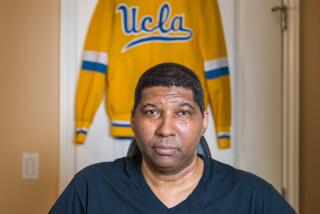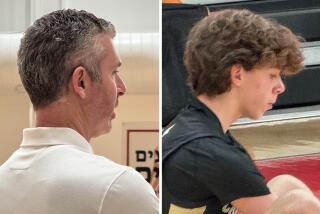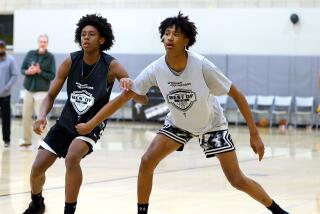Boyer Finally Takes His Celebration of Life Onto the Court : Basketball: It took him years to get over the death of his father. Now, the senior is a big part of the Anteaters’ front line.
- Share via
IRVINE — Groves of eucalyptus wave in the breeze above his head, but UC Irvine students have no trouble seeing DeForrest for the trees. DeForrest Boyer requested before the season that he be referred to by his entire first name, but most of his fans can’t seem to break old habits. They still smile and say, “Yo, Dee,” as he strolls across campus.
On or off the court, the senior center seldom is lost in a crowd. He’s 6 feet 10 and somewhere around 285 pounds, depending on the results of his latest fad diet.
Boyer has learned to make optimum use of his bulk, however, literally throwing his weight around to his advantage on the court. But he will never forget the day he thought he wasn’t big enough.
Boyer was 9 years old when he was riding behind his father during a test drive of a new motor scooter, purchased that day for Boyer’s older brother, Harvey Jr. They swerved to avoid an oncoming car and ran into a parked car.
DeForrest split his lip.
Harvey Boyer suffered internal injuries that resulted in his death two months later.
“He was trying to brace me and he fell off and then the motorcycle fell on top of him,” Boyer said. “I was just too little to hold it up. I couldn’t get it off him.”
The weight of the motor scooter did not injure the elder Boyer, but the image of him laying there will never fade for his son. The handlebars had jammed into his father’s midsection at impact, damaging his liver and pancreas. For two months, Boyer was hospitalized while doctors decided how best to repair the injuries. He didn’t survive the initial surgery.
It was a devastating blow for DeForrest, who viewed his 6-6, 305-pound Marine sergeant father as bigger than life, invincible. The shock was compounded by the fact that he had visited his father every day between the accident and his death. Harvey Sr. was telling his older son to prepare to become the man of his family, but he was keeping up a cheerful front for his youngest son.
“Every day, the whole family, my aunts and uncles and all, would get in the car and drive down to the (military) hospital in San Diego to see him,” Boyer said. “He was usually joking with us and saying he was getting better. I never thought he would die.”
After his father’s death, the grief clung to DeForrest.
“I think it was harder on Dee than it was on me,” said Harvey Jr., who lives with his mother, Clyde, in Las Vegas. “I mean it definitely changed my life. I was 17 and I had to grow up a lot faster. I felt like I had to look after my mom and my brother.
“There were so many responsibilities and so much to do, I was busy. But Dee was there when it happened, and he’s the baby and he was always a little spoiled, so he took it really hard.”
Clyde Boyer had lost her mother when she was only 15, so she knew what her sons were going through. She also knew she could do little to assuage their sense of loss.
“I understood the pain and the anger that they felt,” she said. “And for Dee, to lose someone you love at that age and have to face growing up without a father, it was very hard.”
The two months of hospital visits had drawn an already close family into a tighter knit. And for DeForrest, it merely amplified the sense of void when his father was gone.
“I didn’t have any contact with my friends for a long, long time,” he said. “It was always just my family, and our family life was so different without my father. He was very strict and had the meanest streak you would ever want to see. But he would also joke a lot and was really fun to be around.
“In high school, and even at times at Saddleback (College), I would just sit and cry some nights. But in the last couple of years, I’ve decided that’s not what my father would want. He never let us see him cry and he wouldn’t want me wasting my time crying.
“He would tell me to rejoice in what we had and do something good with my life.”
For Boyer, exultation too often involves revelry at mealtime.
He recently took a hungry-man-sized bite out of a submarine sandwich--turkey, avocado and sprouts on wheat--chewed thoughtfully for a minute and managed a smile.
“Yeah, it’s a constant battle with me,” he said. “It’s not like I eat the wrong foods or anything. I mean I can eat salads all day long and still gain the weight.
“I guess it’s the dressing, because I’ll pile on the dressing.”
He has tried lots of diets, although the lots-of-salad-with-lots-of-dressing regimen is clearly his favorite.
“Lots of (diets) work for a while, but then all of sudden you just find yourself with a hamburger and fries,” he said. “And once you do that, you end up going back for more. I get down to a certain weight and then it just seems to pile right back on. I just can’t keep it off.”
It has been that way for as long as his mother can remember.
“He was nine pounds 13 ounces when he was born and he’s had to fight gaining weight ever since,” she said, laughing.
Irvine assistant Tim Murphy thinks a little discipline at the dining table could have meant a lot of money for Boyer. Big men can make big bucks overseas. Murphy’s brother, Tod, a former Irvine standout who has played in Europe, the CBA and the NBA, is a case in point.
“People with weight problems always want to be lighter, but I feel I can play well at this weight,” Boyer said. “Of course the coaches say I’d be even better with less weight. I mean, I think so, too, but it’s hard, man.”
He sometimes seems more like a huge Pillsbury Doughboy than King Kong of the Court, but Boyer is an impact player for the Anteaters. He’s shooting 65% from the floor overall and 69% in the Big West. He’s averaging 12.2 points, 6.9 rebounds and is third in the conference with 32 blocks.
“Dee has very soft hands and a great touch,” Coach Rod Baker said. “And he’s not a good passer, he’s a great passer. He doesn’t have great footwork and his lower-body strength isn’t that good, which hurts his balance.”
Boyer suffers from tendinitis in both knees and has had his right leg wrapped from ankle to thigh since he strained muscles against Cal State Fullerton in the Big West opener Jan. 3.
The leg is healing, however, and lately, Boyer has been racing up and down the court on occasion.
“Some people witness a full eclipse,” Baker said. “You’ve seen Dee sprint.”
When the Anteaters manage to get the ball inside to Boyer, good things usually happen. But if the defense collapses a little and conditions are not just right, Boyer seldom tries to force the action.
In the last eight games, Boyer has made 35 of 42 shots. In the last four, he has made 17 of 19.
Maybe Boyer should shoot more?
“He’s the guy who understands how well he’s being guarded,” Baker said, “where he is on the floor, where the defenders are and what they’re capable of. You just can’t force a guy to shoot if he doesn’t want to.”
With most basketball players, this is not a problem. But Boyer isn’t the kind to assert himself into situations he can’t control.
“I’m not the greatest-skilled offensive player and my shot opportunities have to come through the offense,” he said. “The fans might think I’m really hot and should shoot more, but I’m not Shaq or whatever. I’m human.
“There are times when I’m in the groove and I want the ball because I know I can score. Everybody forces shots sometimes. I do. And it’s usually because you’re frustrated or you feel like you’re not picking up your slack for the team.
“I’d like to shoot two or three 15-footers every game instead of having to battle it out in the post for every shot, but I’m not going to step outside my role.”
Clyde Boyer will have one more chance to play the role of proud mom this season. The Big West tournament is scheduled March 10-13 in Las Vegas.
But no dunk or jump hook will make her as proud as she will be the day he graduates.
Boyer will need to complete one more quarter next fall to get his degree in criminology. He hopes to get a job as a probation officer or as an agent for the Drug Enforcement Agency.
“He especially likes working with children,” his mother said. “I think he would make a great probation officer. Kids have always looked up to him.”
But then who doesn’t?
More to Read
Go beyond the scoreboard
Get the latest on L.A.'s teams in the daily Sports Report newsletter.
You may occasionally receive promotional content from the Los Angeles Times.










